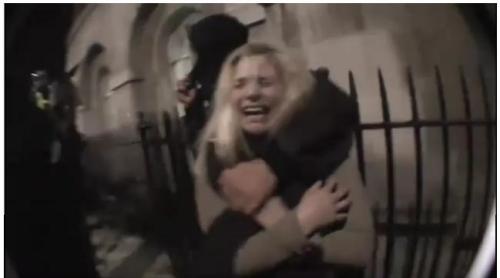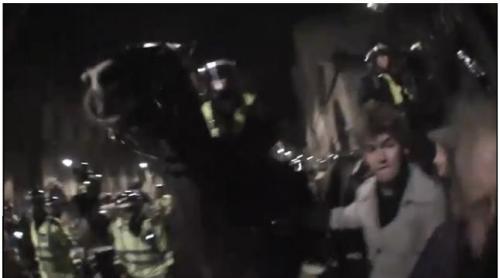Widening Participation
Despite frequent declarations of solidarity, protesting students and academics are failing to join forces with non-academic staff. Except when police brutality momentarily unites them - writes Anathematician
'Students, and workers, unite and fight!', so claims one of the many simplistic, nursery-rhyme-like chants of recent weeks. For university support staff (and indeed academic staff) the reality is, at times, more problematic. Students are often the ones who complain about us, particularly as fees get higher and they see themselves as having bought the right to a degree and a certain standard of service.

Image: Pregnant protester weeps from shock after being charged by mounted police, Whitehall, 24 November 2010
Even students who do genuinely build connections with workers can be selective in the workers they choose. Recently academics and students have worked together nationally and locally against cuts to education. While this is a good thing, there is a risk that they are building what has been referred to as ‘an unprecedented coalition of students and workers who used to be students', while excluding university support staff (although, yes, most of us used to be students too). Students have been very active in their support for contract staff on low pay, and have campaigned for better pay and conditions for cleaning and catering staff. Hopefully this will translate into support for university staff facing further outsourcing and redundancies. Some of the student occupations have included no redundancies and the implementation of the living wage in their demands.
However, sometimes I get the impression that for students, uniting with the workers means: talking to lecturers / University and College Union (UCU); campaigning on behalf of low-paid migrant workers; and supporting striking FBU / RMT workers. All these are worthwhile endeavours, but the workers who actually work alongside them day by day in their universities should also feature in their plans. Students' Unions in particular can be hypocritical, making a mockery of their ‘mission statements', and acting as far worse employers than the universities themselves. They even campaign in support of contract staff in the universities while exploiting and / or bullying their own employees. Several London Students' Unions, some of which claim to be ‘left-wing', hire HR consultants who advise them on how to sack their workers with impunity, exploiting the fact that the law is stacked in favour of the employer.
Having said this, the problem is not all one sided, support staff can be dismissive of student protests, or see it as nothing to do with them, and the unions have been slow to pick up on and support the recent wave of student protest (to the extent that there is now talk of union branches taking unofficial action, and individuals resigning their union positions so that they can support the students). UNISON issued a statement supporting the November 30th protest ON November 30th! Perhaps it is the lack of interest from support staff and their unions which has led to them being marginalised in the recent debates around the education protests. I have been one of a very small group of people turning up at events and constantly asserting that support staff should be part of this movement.
However, there are times when student and worker solidarity does happen, and is a wonderful thing. Wednesday 24 November was a day of action for education, with protests all over the country and all over London. I had to work, but managed to get to two protests during the day. After work I headed down to Whitehall, with a group of university support staff (IT, library and admin) from two different institutions, and the trade union banner from one of our branches. We were going to attend 'a rally with speeches from Jeremy Corbyn MP, Caroline Lucas MP, John McDonnell MP and others'. What we found was something far more interesting - a crowd of young and angry FE and school students, who had been there since the middle of the day, and a lot of riot police, some on horseback. The police maintained that as the rally had been organised in advance and the organiser was here, then of course it could go ahead, and showed us a patch of grass that we were welcome to use, although no one would be able to get to it. Then they proceeded to attempt to forcibly clear both us and the students from the street. No one was particularly inclined to comply with police in this matter. Why should we be? Even in their terms we had fulfilled all the criteria for a legitimate, peaceful protest, and in response they had cut us off from the main body of the protest who were kettled a few hundred yards off, and were now pushing us up towards the Trafalgar Square end of Whitehall.

Image: Mounted police charge without warnnig, Wednesday 24 November 2010
Over the next hour or so I learned several new skills. The first of these was how to put a trade union banner together very, very quickly, while avoiding teenagers running away from riot police, and dodging police horses and burning placards. This is a good skill to learn, as, once we had it put together, the trade union banner proved very useful. We held it up near the front of the crowd as riot police attempted to force us to move. The students appreciated our presence, they quickly realised how useful our banner was, and used it as something to hide behind, rally behind, or use to hold the line. I did have to dissuade a couple of them from taking the metal bars to use as weapons.
The crowd were very young, some looked 14 or 15, most of them were under 20. There were lots of young black and Asian kids, and I get the feeling that as well as being vocally angry about the removal of EMA, they are already angry at the police due to stop and search. They did wonder what a small group of people several decades older than them were doing in their midst, and some asked us if we were lecturers. We explained that we were university support staff, and why we were on the demo (i.e. sharing their concerns about access to education, but also concerned about our jobs being under threat). They were also interested in the institution referred to on the banner. The universities have failed to recognise the value of this kind of outreach work. If they were really serious about widening participation they would pay us to attend such protests. A lot of these students now want to go to this particular institution. Sadly, few of them will be able to afford it, if the proposed fee increases happen.
At this point something happened which has been the subject of discussion. Let no one have any doubt about this, I was there, in the front of the crowd, and I saw exactly what happened. Police on horseback charged at full speed, without warning, into a tightly packed crowd that consisted mostly of children or very young adults. Police on horseback had been making forays into the crowd for some time. This was intimidating, but we were standing up to them, and refusing to move backwards, other than in an organised way, on our own terms, protecting the students whenever possible. Then things changed. The mounted police backed off and lined up. The police on foot moved off to the side. We thought the mounted police were going to advance slowly, as they had before. This in itself is scary, but what actually happened was something that I, as a reasonably experienced protestor, had never seen before. The line of mounted police advanced at a canter. We had been holding the line all this time, but when this happened there was not even any discussion, we just ran. To our credit, we didn't drop the banner. And we were lucky, there was space to the side for us to run to, where we would be safe from the horses hooves. Not everyone was so lucky. Some of the students would have been trampled if people hadn't helped them, and I have heard unconfirmed reports of protestors being injured. Police are denying that this happened. Police lie.
At this point I managed to make a copper laugh. I had just got out of the way of the horses and was shaking like a leaf, the police on foot were immediately trying to intimidate us further, they shouted 'Can you keep moving please?', I politely replied 'Not really, no!' and pointed out that the metal poles of the banner had come apart and that it was a bit of a health and safety issue, and it would be much more sensible to let me fix them. They actually allowed me a moment to do this.
A funny thing about that horseback charge is that it was completely pointless, everything continued as before, with us moving back but only in a controlled, calm way, making sure that the police did not attack these young people with impunity and without witnesses, and holding our ground whenever it was possible and prudent to do so. Eventually the police backed off a little. At this point we suspected that they were planning to block us off at the other end. We headed down a side street and advised others to do likewise. Those who listened got out, I fear the others got kettled. I hope we meet again, and I am glad we had this episode of constructive, disorganised cooperation, I suspect there will be more to come.
Our next stop was the pub, where I stopped shaking and we laughed about what had happened and viewed it as a lot of fun. It was only much later I realised that we are a bit jaded, and really the reaction to a mounted police charge into a crowd of teenagers should be anger and shock. Some of them were hurt and scared, some of them were brave. None of them will forget that it happened, or that it was lied about later. And I hope they are all back on the streets on 9 December (it has just been announced as the day of the vote on the tuition fee increase) and that we are all out there with them, united, and fighting.
Mute Books Orders
For Mute Books distribution contact Anagram Books
contact@anagrambooks.com
For online purchases visit anagrambooks.com






